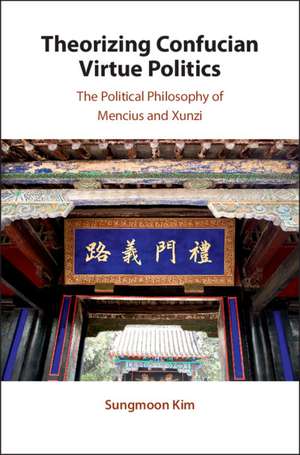Theorizing Confucian Virtue Politics: The Political Philosophy of Mencius and Xunzi
Autor Sungmoon Kimen Limba Engleză Hardback – 13 noi 2019
| Toate formatele și edițiile | Preț | Express |
|---|---|---|
| Paperback (1) | 284.39 lei 6-8 săpt. | |
| Cambridge University Press – 18 aug 2021 | 284.39 lei 6-8 săpt. | |
| Hardback (1) | 595.73 lei 38-44 zile | |
| Cambridge University Press – 13 noi 2019 | 595.73 lei 38-44 zile |
Preț: 595.73 lei
Preț vechi: 735.47 lei
-19% Nou
Puncte Express: 894
Preț estimativ în valută:
114.01€ • 123.79$ • 95.77£
114.01€ • 123.79$ • 95.77£
Carte tipărită la comandă
Livrare economică 18-24 aprilie
Preluare comenzi: 021 569.72.76
Specificații
ISBN-13: 9781108499422
ISBN-10: 1108499422
Pagini: 248
Dimensiuni: 157 x 235 x 17 mm
Greutate: 0.47 kg
Editura: Cambridge University Press
Colecția Cambridge University Press
Locul publicării:New York, United States
ISBN-10: 1108499422
Pagini: 248
Dimensiuni: 157 x 235 x 17 mm
Greutate: 0.47 kg
Editura: Cambridge University Press
Colecția Cambridge University Press
Locul publicării:New York, United States
Cuprins
Introduction; Part I. Confucian Constitutionalism: 1. Interest, morality, and positive Confucianism; 2. Virtue, ritual, and constitutionalism; 3. Before and after ritual: moral virtue and civic virtue; Part II. Wang, Ba, and Interstate Relations: 4. The psychology of negative Confucianism; 5. Hegemonic rule: between good and evil; 6. Responsibility for all under heaven; Conclusion: between old and new.
Recenzii
'A systematic reconstruction of the political theories of two of the leading classical Confucian thinkers, Mencius and Xunzi, by one of the rising stars of East Asian political theory. Sungmoon Kim's new book lays out a theory of Confucian constitutionalism oriented around civic virtue and ritual. In this important contribution to political theory and the history of political thought, Kim displays the clarity and deep erudition that his readers have come to expect.' Stephen Macedo, Princeton University, New Jersey
'Professor Sungmoon Kim has already established an international reputation with his previous books on Confucian democracy. His latest work, Theorizing Confucian Virtue Politics, is sure to solidify his place as a leading contemporary political theorist and scholar of Confucianism. This book is sure to be of great interest to scholars across a variety of fields, including philosophy, political science, Sinology, history, and religious studies.' Bryan W. Van Norden, Vassar College, New York
'With characteristic thoroughness, depth, and breadth, Sungmoon Kim's new book enables a broader audience to appreciate the political theories of Mencius and Xunzi … Of particular note is Kim's reflection on the global political theory of these thinkers and how they wrestled with interstate conflict while maintaining their virtue politics. Kim illuminates the foundational debates of virtue politics, inviting all of us to think about how these are and might be important in the current global era.' Brooke Ackerly, Vanderbilt University, Tennessee
'Nuanced and lucid … [Kim's] analysis of the political philosophy of these seminal figures in terms of virtue constitutionalism, ritual constitutionalist, positive Confucianism and negative Confucianism is both refreshing and insightful. I highly recommend this book to everyone who is interested in Confucian philosophy and political theory.' Chenyang Li, Nanyang Technological University
'Theorizing Confucian Virtue Politics provides a newly elaborated, classical Confucian constitutionalism … Venturing into some largely unknown territory, this book should invigorate further work on the parts of comparative philosophers and Western virtue theorists.' D. P. Prianti, Choice
'The book is likely to be of interest primarily to specialized scholars and researchers in Confucian political theory … an enjoyable and enlightening read also for general students of Chinese culture and religion.' Lehel Balogh, Religious Studies Review
'Professor Sungmoon Kim has already established an international reputation with his previous books on Confucian democracy. His latest work, Theorizing Confucian Virtue Politics, is sure to solidify his place as a leading contemporary political theorist and scholar of Confucianism. This book is sure to be of great interest to scholars across a variety of fields, including philosophy, political science, Sinology, history, and religious studies.' Bryan W. Van Norden, Vassar College, New York
'With characteristic thoroughness, depth, and breadth, Sungmoon Kim's new book enables a broader audience to appreciate the political theories of Mencius and Xunzi … Of particular note is Kim's reflection on the global political theory of these thinkers and how they wrestled with interstate conflict while maintaining their virtue politics. Kim illuminates the foundational debates of virtue politics, inviting all of us to think about how these are and might be important in the current global era.' Brooke Ackerly, Vanderbilt University, Tennessee
'Nuanced and lucid … [Kim's] analysis of the political philosophy of these seminal figures in terms of virtue constitutionalism, ritual constitutionalist, positive Confucianism and negative Confucianism is both refreshing and insightful. I highly recommend this book to everyone who is interested in Confucian philosophy and political theory.' Chenyang Li, Nanyang Technological University
'Theorizing Confucian Virtue Politics provides a newly elaborated, classical Confucian constitutionalism … Venturing into some largely unknown territory, this book should invigorate further work on the parts of comparative philosophers and Western virtue theorists.' D. P. Prianti, Choice
'The book is likely to be of interest primarily to specialized scholars and researchers in Confucian political theory … an enjoyable and enlightening read also for general students of Chinese culture and religion.' Lehel Balogh, Religious Studies Review
Descriere
Makes Mencius' and Xunzi's political thought accessible to political theorists, philosophers and scientists with no expertise in classical Chinese or sinology.
